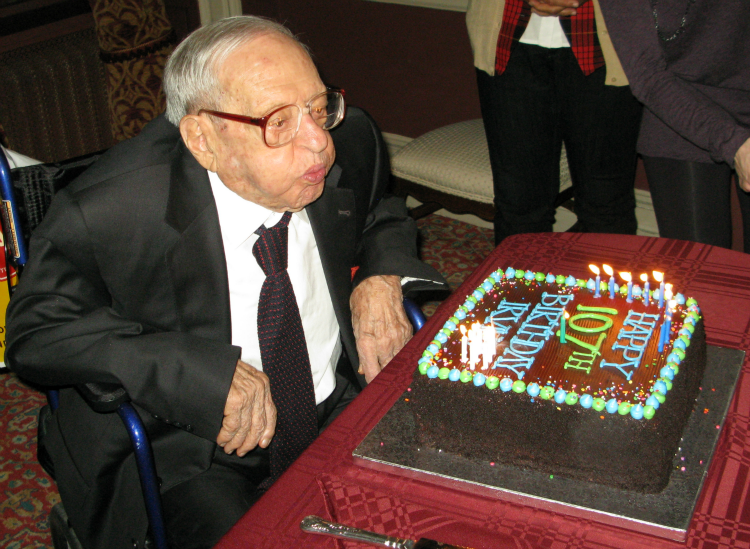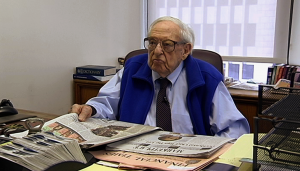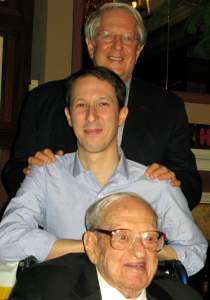I remember it well: the first day I met investment advisor Irving Kahn. At 105, he had boundless energy, a sharp intellect and a mischievous laugh that made an immediate impression.
As I’ve done with many healthy centenarians in the Einstein Longevity Genes Study for which I recruited Irving, I struck up a friendship that has transcended our roles—I as the “scientist” and Irving as the “study participant.” During our deeply personal meetings about Irving’s life and health, I have been floored by his wry humor and endless drive. Incredibly, this maverick of value investing still reports to work at his Madison Avenue office in Manhattan four or five days a week. (Watch Irving’s profile video.) (Meet all SuperAgers.)
Irving is part of a biologically hearty family that escaped nearly all the health challenges of the last century—without even trying. Irving’s eldest sister, Helen, for example, smoked for nearly 90 years. She died in 2011 just one month shy of her 110th birthday. Irving smoked for about 30 years and follows no special diet. I also knew two of their remaining siblings; one died at 102 and one is currently 105. Today, Irving turns a remarkable 107.
The Kahn family, a clan of Ashkenazi Jews, carries a secret that I believe is in their genomes. What can their secret mean for others?
What does Irving think of this incredible milestone? He said, “107 feels alright to me… The only downside is that there are not that many people here my age — some are close but they’re not quite there yet. Maybe if they get older and I get younger, eventually we’ll be in sync.”
Irving’s son, Tom, 70, remarked on his dad’s wisdom and longevity. “We are so thankful for his long life and the lessons he has imparted over the years. It feels great to be with him as he celebrates 107 years of living, and we are already looking forward to his 108th.”
Aging poses a major risk for diseases such as cancer, diabetes, cardiovascular problems and Alzheimer’s, among many others. As a researcher who studies aging, I strongly believe that if we cannot find a way to delay that process, we will not be successful in treating or preventing age-related diseases that rob us of independence and diminish our quality of life.
Modern medicine seems pretty good at helping us escape one disease while increasing our risk for others. For example, people who survive heart attacks because of stents or bypass surgery will often suffer within a couple of years from Alzheimer’s or diabetes or cancer. That is because we doctors treated a single organ—not the whole body. The destructive aging process is systemic and relentless, setting off a domino effect in the body. As scientists, doctors and patients, we ignore the implications at our own peril.
Our study of aging examines the genomes of more than 500 Ashkenazi Jews between 95 and 112 years old. Findings to date include the identification of several longevity genes and blood markers that appear to help protect the body from the ravages of aging. We are doing this research not to extend life or achieve longevity but to prevent or significantly delay aging or age-related diseases and improve the quality of life. (Watch Dr. Barzilai’s interview about his research findings.)
If our research leads to drug discoveries that also lengthen life, we may need to apologize for this side effect, but as long as aging is healthy we will achieve our goal. And consider the potential cost savings: Medical treatment for someone who dies at 100 is only one third the cost of treatment compared with someone who dies at 70. That’s because the 70-year-old is likely to have had expensive chronic illnesses, whereas the 100-year-old likely died relatively quickly.
Irving’s main contribution to studies like mine is that he demonstrates that even when a person reaches age 107, his or her quality of life can remain high and that life can be enjoyable as long as that person is healthy. Irving captures time intensely; he told me he reads only nonfiction, and he playfully added that since he avoids novels and sex magazines, he has a lot of time to learn from his nonfiction books. Most amazing, though, is his enduring passion for his work. He told me that if someone were to take his job away in value investing he would try to buy it back.
Imagine feeling that way about your job at 107. Consider what your own quality of life would be if you were still that engaged and had been spared age-related diseases.
Happy birthday, Irving! Your example (like your genome) is teaching us every day.





Comments on this entry are closed.
What an amazing story!
People forget that health encompasses wealth. If you eat natural foods, low calorie with rich in fruit and vegetables, and having a low-stressed job on top of a low stressed environment, you can see a trend of long life expectancy. Everything is not about genes. Sometimes its just plain and simple public health & sociology.
It is an wonderful story.
A remarkable story. What did he do early in life ? Does he exercise and eat vegetarian diet? Does he take any supplements? That would be helpful to know. Thank you very much.
It is an amazing story, with a powerful message of Hope.
Thank you,.